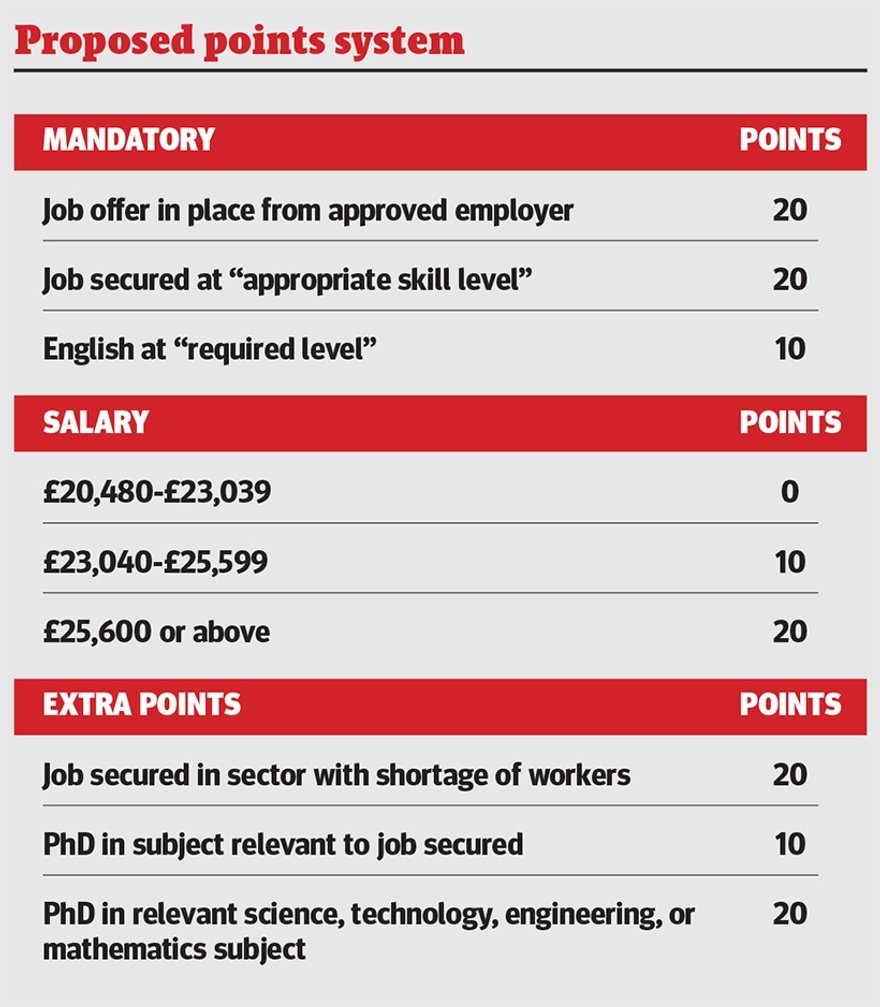Immigration policy a 'hammer blow' that will see hospitality businesses close
The hospitality industry's future is hanging on a knife edge following the announcement that the immigration policy to be introduced in January 2021 will have no provision for workers the government deems to be ‘low-skilled'.
As the Brexit transition period comes to an end in less than 11 months, operators and prospective employees will face a series of hurdles to appointing staff from outside the UK in what has been described as "another hammer blow" to the UK's third largest sector. Prospective workers will need a job offer from a sponsored employer with a minimum salary of £25,600 – although there is a suggestion this could drop to £20,480 in industries with staff shortages if other conditions are met – as well as meeting a minimum English language standard.
Even if these requirements are met, potential employees will need to tot up 70 points in a system that prioritises high salaries and qualifications, with the Home Office estimating that 70% of the UK's current EU workforce would not meet the new requirements.
With unemployment at a historic low and hospitality needing to find 200,000 additional workers this year, in part due to a fall in the number of UK-born 18- to 24-year-olds entering the jobs market, the staffing crisis looks set to get considerably worse with operators from across the sector voicing their concerns.
Kate Nicholls, chief executive of UKHospitality, told The Caterer: "The absolute ban on low-skilled workers and the rapid implementation of this is going to be incredibly challenging and it's hugely disappointing that there's no recognition that the economy needs talent and skills at all levels.
"The government doesn't seem to understand how tight the labour market is. There is not the volume of labour out there to fill the gaps we've got at present, let alone the new ones that might come."
The industry body has said its focus will now be on having hospitality classed as a shortage occupation by the Migration Advisory Committee, which will provide a point boost for potential workers. It will also push for an extension to the youth mobility scheme, which allows eligible 18- to 31-year-olds to live and work in the UK for two years, and the creation of a new two-year work visa.
If these aims can be achieved, Nicholls said the industry could "work with the system", but without them, she said, "something will have to give and, at the moment, it will be the forecast growth in the sector, investment and the regeneration hospitality can bring to areas of the country where the government wants to see it."
Operators have today warned that, if the proposal goes ahead unchanged in January, there will be business closures. Tim Foster, founder of Yummy Pub Co, told The Caterer: "I think you'll see massive casualties; you're already seeing them. We've all been trying to fight business rates and have already seen everybody making cuts and now this is another hammer blow. It's the government saying we don't care."
On the day the government closed the door on those it deems ‘unskilled', Foster added: "We're incredibly proud of taking people without skills, but with great attitude, and developing them and nurturing them to be future hospitality leaders. It's what we've built the entire ethos of our business on.
"Look at my workforce and how much they contribute in terms of taxes and national insurance. My guys call this home and they want to develop and grow here. What does today's announcement say – it says 'no, we don't want you'."
Will Beckett, co-founder of steak group Hawksmoor, said he did not think the industry as a whole would be able to adapt to the changes: "At an industry level I think it's going to be awful. If there was high unemployment this could make some sense, but unemployment is historically low, which begs the question ‘where are these people going to come from?'.
"As a result of turning off the tap, some businesses are going to close; they will fail to adapt to that new reality and staff shortages will get worse. The operating environment for restaurants is so difficult at the moment and I think a lot of places will struggle to get it right."
With a high proportion of British staff, low turnover and a good reputation as an employer, Hawksmoor is in an enviable position, but Beckett said that both his business and the hospitality industry as a whole would need to build on the work already done to attract British workers into its jobs if it's going to prosper.
Once again the industry, which accounts for approximately three million jobs in the UK, looks set to be disadvantaged by government policy, which could in turn hit its reputation as a world leader in hospitality.
Beckett added: "The laudable goals of the industry are not the government's goals. It is not interested in world-class hospitality being part of modern Britain, or how the how the outside world views us; its priority is us employing British workers."
Home secretary Priti Patel has suggested there are eight million people aged between 16 and 64 who are "economically inactive" and able to fill the workforce gap likely to emerge across the UK economy, however these claims have been widely dismissed as disingenuous with the majority of this group made up of students, carers the sick and retired.
Umbrella Training founder Adele Oxberry agreed with Beckett that the hospitality industry will need to accelerate its work to showcase the opportunities in the industry to younger generations.
She said: "We see from our work in schools that there is a huge misconception about the reality of our industry. The Government needs to demonstrate its commitment to a sector which employs one in ten people by supporting more awareness in schools and colleges about the benefits of working in hospitality.
"The continued suggestion that some of the roles in hospitality are ‘low skilled' doesnt help the already negative perception some incorrectly have about our sector. These are incredibly rewarding careers that are being dismissed through unhelpful use of language."
Legal advice
Shara Pledger, associate at Latitude Law, has stressed that employers need to be preparing now for the changes to legislation. She explained: "Those currently relying upon EU staff will need to bring themselves quickly up to speed and the policy statement lays out two important things to consider. Firstly on right to work checks; employers, landlords and public service providers will be able to continue to accept EU citizens' passports and identity cards as evidence of their immigration status until 30 June 2021. That is a good short-term solution, but employers would be wise to note the end-date for this stop-gap and start to plan and take advice on the steps they'll need to take from July 2021. "Secondly those employers who will need to sponsor migrant workers from 2021; the government suggests becoming a sponsor now in order to have the groundwork in place for the additional administrative and bureaucratic burden that will need to be shouldered into the future."
Continue reading
You need to be a premium member to view this. Subscribe from just 99p per week.
Already subscribed? Log In







